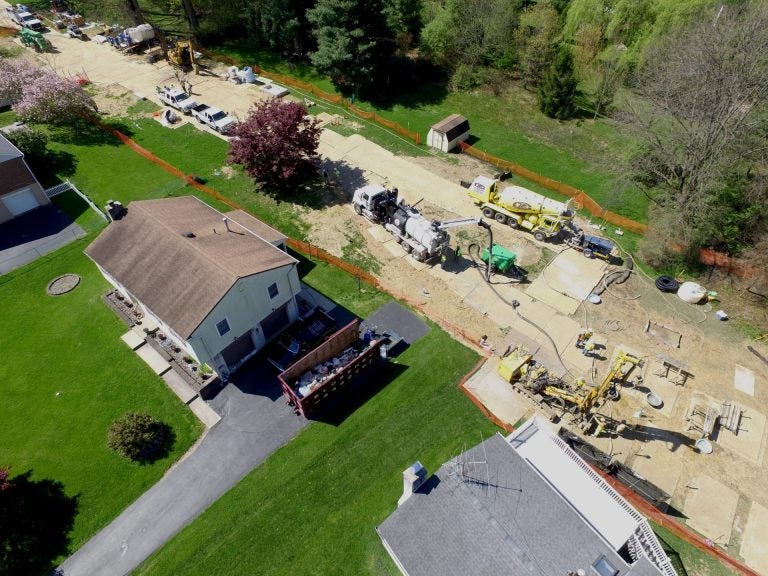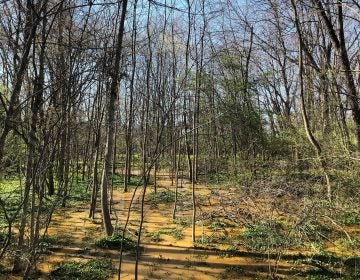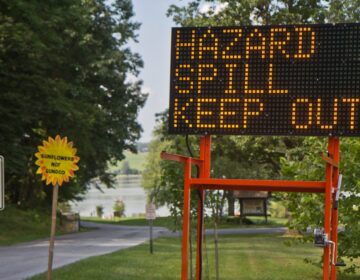PUC judge orders Sunoco to improve its public safety guidance, and pipeline safety, on Mariner East project
Plaintiffs wanted the lines shut down, but a judge declined to halt the operation.

Mariner East 2 pipeline construction crews work in the backyards of homes on Lisa Drive in West Whiteland Township, Chester County, on May 2, 2018. (Marie Cusick/StateImpact Pennsylvania)
This story originally appeared on StateImpact Pennsylvania.
___
An administrative law judge with the Pennsylvania Public Utility Commission ruled on Monday that Sunoco Pipeline, a subsidiary of Energy Transfer, violated state and federal law by failing to adequately communicate public safety risks of their Mariner East natural gas liquids pipelines, which run through the densely populated Philadelphia suburbs.
Judge Elizabeth Barnes ordered the company to edit its written material for nearby neighbors, schools, and nursing homes, to include the terms “property damage, personal injury, burns, asphyxiation, and death (fatality),” which could result from a leak or explosion of the highly volatile natural gas liquid lines.
Barnes also ordered the company to expand its emergency contact list in Chester and Delaware counties to include police departments and school districts; undertake additional public outreach; and pay a $2,000 fine.
The company must also bury deeper two currently operating lines that date back to the 1930s. Originally built as petroleum pipelines, Sunoco has repurposed them to carry the NGLs from western Pennsylvania to an export terminal in Delaware County. One of the lines is operating as a workaround because work on the Mariner East 2 line has been delayed by recurring sinkholes, or subsidence, in the region.
The case Flynn v. Sunoco Pipeline, also known as the “Safety Seven” case, was filed by people who live along the line, and after consolidation of several similar lawsuits now includes additional people and a homeowner’s association. Both Delaware and Chester counties, as well as several area school districts and municipalities and the Clean Air Council, joined the case against Sunoco as intervenors. The ruling is limited to Delaware and Chester counties.
“This entire case was a monumental effort on the part of regular residents living along the Mariner East pipeline,” said Eve Miari, who lives in the area and works for the Clean Air Council. “Residents really banded together in this grassroots movement, and they were joined by the counties and the townships and the school districts in bringing forward their very real and serious concerns about the safety impacts of this pipeline.”
Miari considers the ruling a win because the judge confirmed a number of safety issues brought up by the plaintiffs. The judge did not go as far as shutting down the line, which the plaintiffs asked for and which they say is the only way to reduce the risk to zero.
“There are aspects of this pipeline in close proximity to homes and schools and nursing homes that is simply not safe,” she said. “There are ways in which the operator has failed in its duty to meet the requirements of the law and the operator is being ordered to correct those deficiencies. So those are all wins for the residents and the communities and the school districts and the counties. However, the ruling fell short of stopping the pipelines entirely. And that, of course, is a disappointment to all those involved on the side of the plaintiffs.”
Construction of the line through Delaware and Chester counties has resulted in dangerous sinkholes that exposed the operating Mariner East 1 line and led to the PUC shutting down the entire line for safety. Sunoco has purchased several homes in West Whiteland Township where the sinkholes have rendered them unsafe.
In 2018, an explosion on the company’s newly constructed Revolution pipeline destroyed a nearby home. Nobody was injured, but the leak was caused by subsidence after a heavy rainstorm left the line exposed. This summer, sinkholes developed along busy Route 30 in Chester County.
Barnes wrote that there is evidence the 8-inch Mariner East 1 line, along with the 12-inch workaround line, “lack appropriate depth of cover” and may be sited too close to one another. It’s unclear what Sunoco will do to remedy that. The company said in a statement that it does not comment “on issues related to current or pending legal matters.”
The statement said Sunoco is pleased with Barnes’ decision, and touted the benefits of natural gas liquids as “building blocks for thousands of products we use every day.”
Barnes did not rule on a number of safety issues, which she wrote in her opinion should be handled by an internal PUC rule-making procedure to reform pipeline regulations. That process is ongoing and was open to public comment.
Clean Air Council’s Joe Minott praised the ruling as a way to address inadequate regulations regarding natural gas liquid pipelines, but urged the order to extend across the state.
“The testimony in this case casts further doubt on the safety of the operating Mariner East lines, and made clear the PUC has more work to do to address the public’s serious concerns,” Minott said. “We will not waver in our call for them to be shut down once and for all. In the meantime, the fixes that the Judge ordered should be applied across the state.”
Barnes’ order still needs to be reviewed by the Commissioners, who could accept some aspects and reject others. Once the final order is issued, either side could appeal.
Editor’s note: A previous version of this story identified Eve Miari solely as a member of Del-Chesco United. She is also employed by Clean Air Council.
WHYY is your source for fact-based, in-depth journalism and information. As a nonprofit organization, we rely on financial support from readers like you. Please give today.







